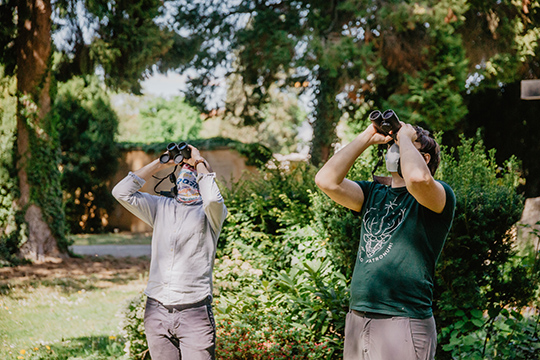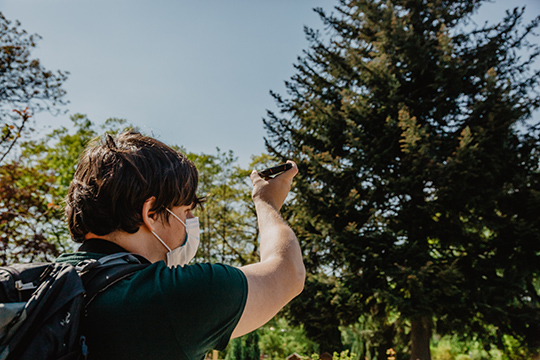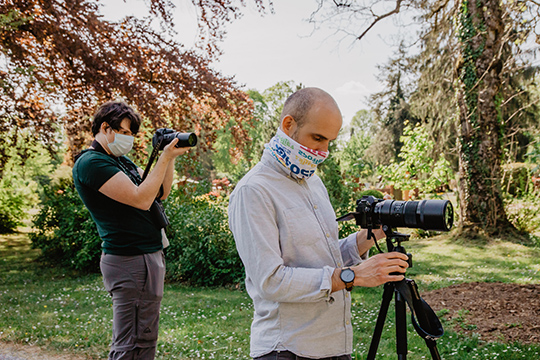A Eurasian blackcap - bingo!
Freiburg, May 05, 2020
A year ago, Bachelor student Dennis Günther was walking through natural landscapes. Along with other students and his professor, he took guided birdwatching walks in places that included the nature reserve Wagbachniederung outside Karlsruhe, and on Lake Constance. But that kind of excursion will not be happening at the University of Freiburg for some time to come. In the age of Coronavirus, they are taboo. Now, everything that was possible outdoors is to be made accessible in virtual spaces. And the real field trip is still planned - but with a difference.

What birds can you see? Bernhard Eitzinger (left) and Dennis Günther collect material for the field trip, which the students will go on later alone or in pairs. Photo: Sandra Meyndt
The University of Freiburg is currently working at high speed to create online excursions. And Dennis Günther is helping out. His task is to make an online module in Basic Ornithology for the Bachelor of Environmental Sciences program for Alexandra-Maria Klein, Professor of Nature Conservation and Landscape Ecology. Part of the module includes excursions. They are in two parts and are composed of a virtual and a real tour, Günther says.
In the virtual excursion, the teachers go into the field - for example to the Kaiserstuhl or up to the Feldberg. Once there, they record what they observe, but they also explore relevant topics on the spot, talking for instance about which natural features occur on the Feldberg and which bird species may be found there. Later, they make all this material available to the students. It’s planned that the observation locations will be tied to GPS data so that students can take the tour themselves later on.
Determining birdsong via app
On a real field trip, students go off alone or in pairs, equipped with binoculars, a guidebook - and an app on their phones which allows them, for example, to find out which bird makes the calls they hear. Günther has summarized instructions for the apps in short online tutorials. But all that can’t replace an expert out in the field. But it does help students experience their own observation successes. Günther aims to support that - both with knowledge and with the right tools. There is also to be an online forum, where students can upload their own material. The aim is to create an exchange, both between the students and with the teachers. Moreover, the forum helps show how well this kind of excursion is accepted and what learning effects could be achieved with it.

You will recognize them by their twitter: Birdcalls can be identified via app. Photo: Sandra Meyndt
Discover plants and cross them off
Ornithology is just one module in the minor subject on environmental protection which has been planned as an online unit due to the coronavirus crisis. There are six modules in her professorship area alone, says Alexandra-Maria Klein. And each module includes at least two field trips. In the Bachelor’s program, Klein has more than 250 beginner students every semester; this summer semester they are to go on field trips as usual. But with a difference. In pairs, and without the teachers who would offer on-the-spot help.
Of course the students are told exactly where to start their tours. And what to discover at the Kaiserstuhl or on the Schönberg. Klein and her team have developed material, including a list of everything there is to discover, from side to side and top to bottom. It works like a game of bingo, Klein explains. “Every animal, every plant that is discovered can be crossed off.” The goal is to get at least one complete row.

Photos and videos of the Eurasian blackcap, the house sparrow, and the robin redbreast are uploaded to an online platform for students by Dennis Günther (left) and Bernhard Eitzinger. Photo: Sandra Meyndt
Collect, cut and add sound
Klein and her team also guide Master’s students outdoors, for instance in the Field Ecology module. The setting is accordingly more demanding. All the students in this module - which is offered in German and in English - have a small research project to work on, for instance to count and evaluate the species of bees on meadows of different altitudes. The tools they need are available online. Various methodologies from vegetation ecology, zoology and soil science are provided for students in this module. The students can choose - I need that, don’t need that. They can of course ask questions, says Klein. Along with the practical work, there will be online meetings to discuss questions. Most of the field trips in Nature Conservation and Landscape Ecology are still under construction. Videos still have to be recorded and sound cut onto them. But slowly, more and more good material is coming together.
“It was important to us not to cancel the field trips,” says Alexandra-Maria Klein. Just working through dry theory is not very exciting, she adds. Günther agrees. Excursions in the age of coronavirus have the disadvantage that you can’t draw on the expertise of teachers in the field, and successes can’t be shared with a wider group. “Nevertheless, you can still experience learning,” he says. And there is one clear advantage. The e-learning material makes studying much more flexible for everyone.
Stephanie Streif

